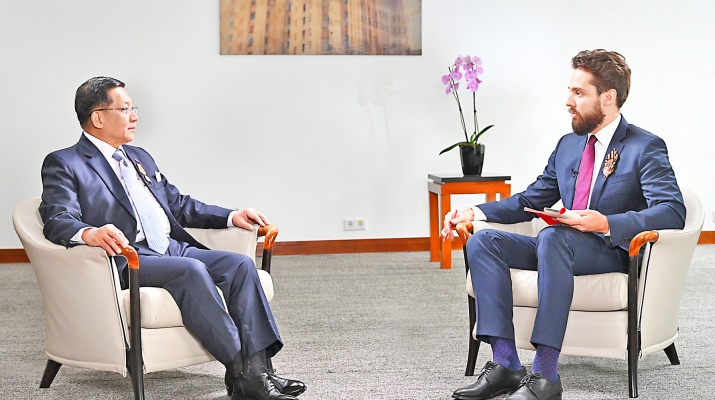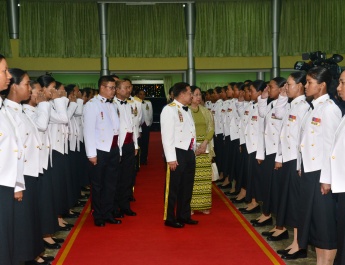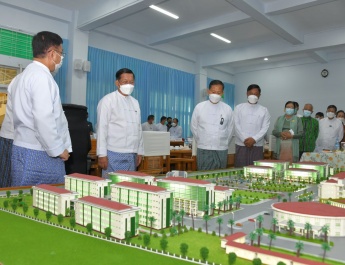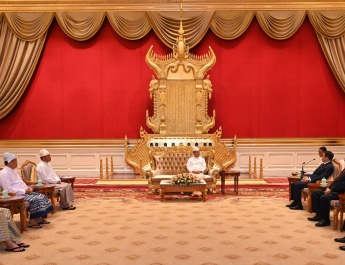Chairman of State Administration Council Prime Minister Senior General Min Aung Hlaing received RT TV Channel at Ararat Park Hotel in Moscow on 8 this month and answered questions of the TV channel. The full text of the interview is as follows:
Q: Your Excellency, the Prime Minister, first I would like to express honour for having the opportunity to conduct this interview. I would also like to thank Your Excellency for attending the 80th Anniversary Victory Day of the Great Patriotic War. In fact, the Victory is priceless for our country as well as for Myanmar that had driven out the Fascists. We all know that the earthquake had triggered a lot of losses and destruction in Myanmar, so, let me express my sincere condolences for this tragedy. As regards the quake, my first question is your comments about the incoming aid and efforts. How supportive are the relief undertakings? Is everything proceeding in a satisfactory way? Tell me please.
A: Thank you for your empathy towards the earthquake jolted on 28 March. Actually, it was quite intense. The earthquake measuring 7.7 magnitude on Richter scale is the second most powerful one among the quakes that trembled after 1900. Of the 18 quakes in Myanmar, the one measuring 8 on the Richter scale in 1912 is so intensive. The recent one also propelled a huge jolt, causing a high number of casualties. Over 3,700 persons were killed, over 5,000 wounded and another 80 were missing. Approximately, the quake also destroyed 67,000 homes, 6,400 schools and 350 hospitals. Many roads and bridges were damaged. As regards the international aid, I declared a state of emergency within an hour as I had witnessed that the extent of damage caused by the quake was very high. And then I asked for help from the international community, and the relief aid from abroad arrived in the country within 24 hours. It was very empowering. Roundabout 26 countries including Russia alongside China and India, helped us. A common belief is that there will be a chance for survival if the help arrives within 72 hours. But international relief teams arrived within 24 hours and could rescue eight alive. Many dead bodies were recovered. Anyhow, we were encouraged by their help. In addition, relief aid arrived by air, sea and road and they were helpful for the country. But we need further aid for the follow-up rubble clearing and reconstruction undertakings.
Q: Currently, the bilateral relations between Myanmar and Russia are developing fast. What’s more, I had visited Myanmar to gather news about Russia-Myanmar joint naval drills in person. In addition to military technology cooperation between the two countries, which areas and sectors are also included in the bilateral cooperation agenda.
A: The area of Russian-Myanmar cooperation is very wide. Apart from the defence sector, the two have many more areas, including legal, educational, and health sectors, of cooperation. Some of the issues are still under discussion. During the March visit, talks were held on erection of a nuclear power station and Dawei deep sea port and on investments in offshore oil and gas drilling. Some of the issues have already got the green light and some are in progress. There are many remaining areas.
Q: Instead of providing earth-quake aid to Myanmar, the US has hiked its tariff on Myanmar to 44 percent. Your view on this matter, please.
A: In fact, the US is not refusing to help Myanmar. The country announced a 9-million-dollar aid package. But we have no knowledge about the details of their aid distribution method. We do not know whether the aid will come through the UN or AHA Centre. We only know that it had made the announcement. Our trade volume with the US is not large. We had trade just about US$-900 million during the period between 2011 and 2025. Normally, annual trade only exceeded US$-800 million. In some years, we exported more and in some other years the US exported more. The US is not imposing tariff only on Myanmar, it is imposing tariff even on some of its friendly countries. The US tariffs on China are rather high. In my opinion, the US should not hike tariffs on a developing country like Myanmar. The country is extending tariffs on other countries as it is facing a trade deficit. In fact, it should not do so. We need to think seriously about the reason behind the matter.
Q: I’d like to raise one more question. Regarding trade sanctions and interest rates, what kind of response plan does Myanmar have in place? May I know how you have made preparations?
A: Primarily, we will emphasize trading without emphasizing a single country and we will operate trade with many countries. Instead of going to just one country and selling our goods there, it’s better to trade with many countries equally. I think that as being better for cooperation too. What I want to add is—why are they increasing tariffs like this? That’s something we have to consider as well. They say they’re increasing tariffs because they’re losing money from trade. Then the question is, why are they losing money? Is it because they can’t sell their products? Why can’t they sell them? Products of the United States are being sold. These products are good and high quality. But their prices are high. As prices are high, it becomes a bit difficult for all to buy their products. However, I’ve found that in many countries, including developing nations like ours, the demand of the market of the United States is very strong. That’s why we’re able to sell a lot to them. But we should also think about why their goods are expensive. Is it because of the cost of production? If that’s the case, we need to take those factors into account. Based on that, we might need to make adjustments. Rather than relying on just one country, we should sell our goods to other countries as well. What I’ve seen is that many of us heavily depend on their market. That’s something I believe is worth thinking about.
Q: I have known Your Excellency arrived in the Russian Federation to join the anniversary of the Victory in the Great Patriotic War. As it is the 80th Anniversary celebration, our Russian Federation notably marks it. Regarding this commemorative event, the question I’d like to ask is: the victory was achieved 80 years ago. How has that victory influenced or transformed the current geo-political landscape we see today? I’d also like to hear your perspective on this.
A: This is a commemoration of the victory achieved by the people of the Soviet Union over the fascist Nazis. It’s a deeply significant event. Similarly, in Myanmar, we too suffered under the oppression of fascist Japan, which was allied with the Nazi Germans—both part of the same fascist bloc. We also have a history of fighting back against them. These events happened around the same period. This was a struggle aimed at securing independence and firmly establishing our nation’s sovereignty. That’s why I would like to say that this was an extremely significant battle, an offensive. Because of this successful resistance, we witnessed the liberation of some European countries that had previously been subjected to colonial-style domination and occupation. They regained their independence because the Soviet Union led and launched a counteroffensive that helped liberate them. The Soviet troops even advanced and took control up to East Berlin in Germany. I saw it in the history. And then, it is geopolitics. If we look at the events of the past, those historical developments were also driven by geopolitical factors—firstly, geography itself, and secondly, the natural resources, both above ground and underground. It was all rooted in these factors. Geopolitics plays a crucial role. Even now, we can see that because of geopolitics, powerful nations are still targeting smaller or other countries. What can they
do over those smaller nations? As a result, we observe pressure being applied through military, political, economic, and various other means over these countries. Now, the celebration of the 80th Anniversary of this heroic patriotic war is truly a remarkable occasion. During that war, 26 million Soviet and Russian people gave their lives in fighting. In the history of world wars, I would like to say this was one of the most massive offensives with the largest casualties.
Q: Regarding our history, during the Second World War, the Soviet Union led the fight to victory with great success. This is a factual and true part of his-tory. However, Western countries want to revise this history by portraying themselves, through videos and historical documentaries, as the main victors and key contributors in that war. Especially in relation to the current Russia-Ukraine conflict, the Western media is depicting Russia as the aggressor. So, what I want to know why do Western countries want to rewrite the history that you personally witnessed? And how do you see this situation from your perspective?
A: History cannot be lied about, and it cannot be concealed. History must remain as it truly was. Just as the actions of the fascist Nazis cannot be hidden, neither can the history of the Soviet Union fighting against fascism be erased or concealed. It cannot be rewritten either. History must exist in its entirety, as it actually happened. This is undeniable. That’s why some countries may want to revise history to prevent future generations from knowing about the wrongs they committed. They might want to push towards a ‘New World Order’. They might also want to steer the younger generations in that direction. When it comes to national sovereignty, many won’t act unless it threatens them. But once their sovereignty is at risk, a response becomes natural. Another factor is their desires and egos. When these emerge, they seek out problems and talk about them trying to solve them. We’ve seen such things in real, historical events around the world. Even looking at the recent conflict between Ukraine and Russia, it’s the same. To speak frankly, I see efforts to rewrite or reverse history. Russia is trying to draw from the Soviet Union’s past experiences to act in ways that protect its sovereignty and avoid any threats to its authority.
Q: In the same vein, we would like to ask about Ukraine. It has been reported that Western countries, particularly the EU and the UK, are continuously providing financial and military support from behind the scenes. What are your thoughts on this? The world is well aware that Washington is pushing for a diplomatic resolution regarding the Ukraine-Russia conflict. However, instead of offering a proper diplomatic solution, EU member states and the UK continue to provide military and financial aid. We would like to hear your perspective on this matter as well.
A: War is something best avoided altogether. Conflicts are best resolved through proper dialogue and negotiation. Escalation often occurs due to excessive support and encouragement. Without such backing, conflicts would not grow. In some cases, when disputes arise between two nations, others rally behind them—offering support, assistance, weapons, funds, and supplies. This is what has been happening. Such actions only amplify the conflict. To prevent this, the best approach is to refrain from fueling the situation. Instead, political solutions should be pursued—this is the way forward. Earlier, you asked about the EU’s actions regarding the conflict and their intentions. What is their goal? One might consider whether their aim is to prolong the conflict to exhaust the other side. That is something worth reflecting on. In truth, the best approach is to prevent conflict altogether. Personally, I believe support should not be given. Instead, negotiations should take place. Why did this happen? What caused the problem? We must revisit the root of the issue. History holds the answers. If we look back at the situation over the past decade or two, it becomes clear why the Ukraine-Russia conflict arose. If we address the issue based on the true cause, I believe this problem can be resolved.
Q: Following up on the previous question, some are concerned that after the Ukraine conflict is resolved, the U.S. may increase direct confrontations with China. Given this, do you anticipate that military tensions could escalate in some form in the near future?
A: There is certainly a possibility. The reason is that since the post-1950s era, the U.S. has historically pursued a China containment policy. Now that China has become a competitor, the U.S. will likely seek ways to counterbalance it. Therefore, I believe all nations should engage in dialogue and cooperation to prevent such tensions from arising. This issue isn’t just between these two countries—it involves others as well. A conflict limited to just these two nations might not be catastrophic, but if other countries get involved, the situation could become far more complicated. That’s how I see it.
Q: From what you’ve said, I understand that this issue isn’t just between China and the U.S., but if other disputed territories get involved, the problem could grow even larger. In this context, how can Myanmar—positioned between major global powers—help mediate these rising tensions? What plans does Myanmar have to play a stabilizing role? I’d like to hear your perspective.
A: Myanmar’s foreign policy is independent and active, maintaining friendly relations with all nations. The U.S. is a friendly country to us, while China is not only a neighbouring country but also a strategic partner and a close relative-like ally. Our relationship with China is uniquely strong compared to others. Therefore, Myanmar will continue to engage with both nations in the best possible manner to foster stability.
Q: Regarding the increasing involvement of NATO in the Asia-Pacific region, how do you assess this development? Do you foresee any potential threats to Myanmar and the surrounding region due to the presence of major powers? We’d like to hear your thoughts on this.
A: Well, there is certainly cause for concern. The truth is, NATO has no real connection to East Asia and the Pacific. We are worried, but frankly, it has nothing to do with them. The Asia-Pacific region encompasses both continental and maritime territories, making it a strategically vital area. If handled peacefully, it could greatly benefit the world. However,
we’ve observed that not just NATO but also countries like India, Australia, Japan, and the U.S. are collaborating to assert their influence here. In my view, this could further escalate tensions. That’s why I believe a peaceful approach would be best. Yes, I am concerned—deeply concerned.
Q: Following up, I’d like to ask about the future of international relations amid efforts by many Western powers to maintain dominance and control. What is your perspective on the multi-polar world order as a guiding principle for shaping global relations? Currently, Western nations are exerting pressure on other countries to serve their own interests. How do you see the multipolar concept in this context?
A: In the past, the world was unipolar, dominated by the U.S. and the Western bloc. Then it became bipolar, and later reverted to unipolarity as the West gained strength. But today, countries like Russia, China, and India have advanced significantly—militarily, economically, and technologically—leading to the emergence of a multipolar dynamic. This is how it should be. No single power should control the world alone. Developing nations, in particular, have suffered under such dominance. That’s why I firmly believe a multipolar system is the best path forward. Sharing and jointly managing global affairs is undoubtedly the best approach. Balanced and equitable cooperation is also optimal. Shared responsibility remains ideal. The conflicts we see today stem precisely from imbalance and inequity. Therefore, if we wish to prevent conflicts, I firmly believe a multipolar system represents the most effective solution.
Q: I have a question concerning the Multipolar World you just talked about. It was learnt that many countries including Myanmar support the Multipolar World. Here, western countries want to return to their previous Unipolar World. To achieve success in implementation of the Multipolar World, what kind of tactics do you think should be adopted? I would like to know your belief about the issue.
A: There are three countries I just talked about. I think the three countries are taking fair measures in the world. So, we ourselves must try to cooperate with them. It would be impossible if we did not try ourselves. We ourselves must exert efforts for the development of our economy, technology, etc. On the other hand, we need to further cooperate among countries. The countries I just talk about are the world’s leading countries and Russia, China and India are in a position to take the leading role. If they cooperate and take necessary measures in a fair manner, our Multipolar World will be a global order.
No one of us accept the Unipolar world. All countries that have borne the brunt of it know all possible scenarios. We know its bitterness. So, no one will allow this. All countries are trying hard. If any country and people stood still, they would be left behind. Any country that stands still will be left behind. Countries that are moving forward will overtake them. So, every country is moving forward. As they are moving forward for progress, they all, based on past incidents in history, bear in mind that they will not allow this to happen. At the same time, if we cooperate with the leading countries I just talked about, the Unipolar World will never be possible, I think.
Q: Myanmar is a member of the ASEAN, which is one of the regional bodies of influential members. What role is Myanmar playing in ASEAN?
A: As a member country, we fully cooperate with the organization in accordance with the ASEAN Charter. The vision of ASEAN is excellent. So, Myanmar has a will to take its correct path and is also doing so. There are different perspectives over some issues among members. However, it already had its fundamental principles. I would like to say that it is important for the organization to carry out tasks based on its fundamental principles.
Q: Another question I would like to ask is what the perspective of ASEAN members on future relations between Russia and the ASEAN is.
A: I would say that Russia is one of the important countries for ASEAN. Ours is the country that is responsible for coordination between ASEAN and Russia from 2024 to 2027. In the past, we played the same role between ASEAN and China. We performed our duties successfully. Now, we have taken the responsibility for coordination between ASEAN and Russia. We have a desire to improve the relations between Russia and ASEAN as it is one of our friendly countries. Russia is one of the important countries for ASEAN and it also is a dialogue partner. So, we view that Russia will continue to play an important role in cooperation with ASEAN in the future. I would like to urge Russia to take expansion of cooperation in multiple sectors with ASEAN into consideration.
Q: This question is concerned not with politics but with our news agency, which has been operating for about 20 years. What is your view on operations and reporting of our news agency?
A: As a leading news agency, its news presentation is quite impressive. I watch RT’s programs frequently. Its news reports are valid and reliable. It can provide detailed facts comprehensively . When it comes to reporting and presenting historical backgro-unds, we find that it is a news agency that should be imitated. We have learnt a lot from it. Therefore, I think that RT is a news agency of high standards. I hope RT will achieve greater success than its 20 years’ achievements. I believe that RT will further improve Russia-Myanmar relations and relations between Russia and the rest of the world. I wish further success for the news agency.





